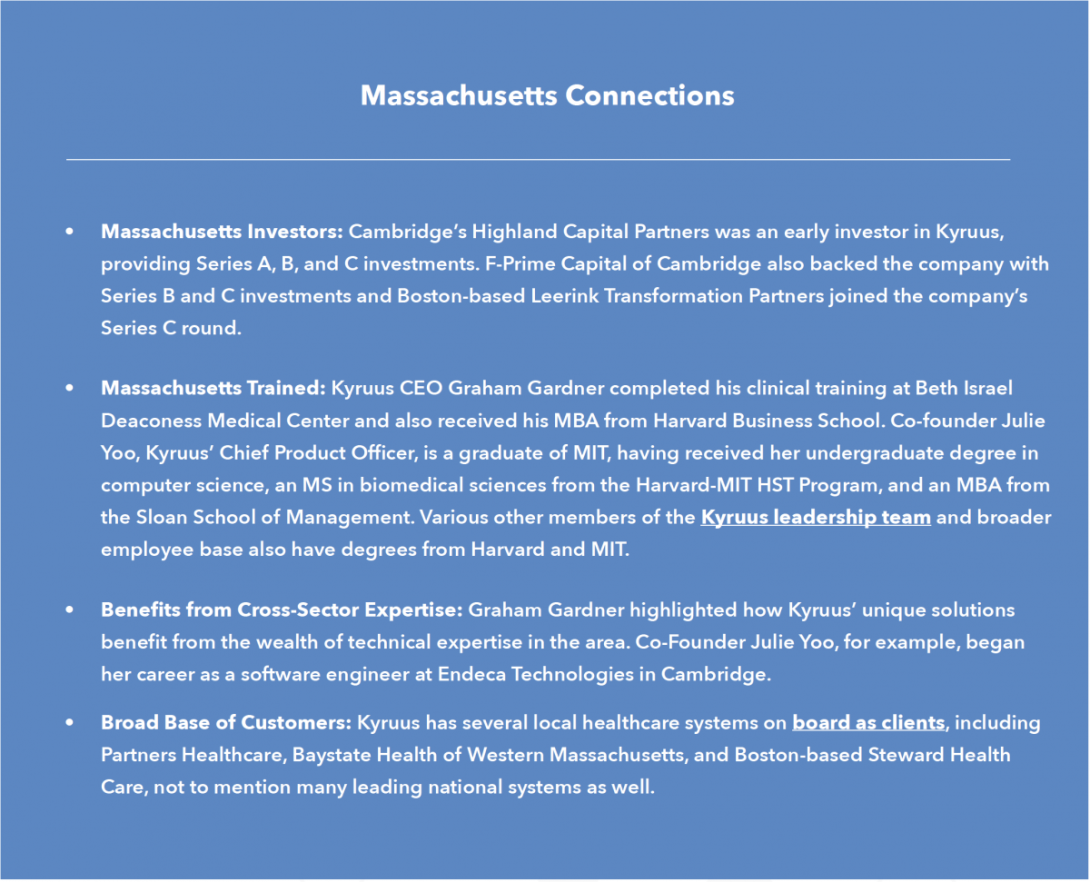
When talking about the way his company is attempting to change healthcare, Kyruus CEO & Co-Founder Graham Gardner, MD starts with Moneyball, the book that described how Oakland A’s general manager Billy Beane flipped the sport of baseball on its head through an analytical approach that recognized the inherent value of utility players that other teams had historically discounted. The approach was all about capitalizing on the unique strengths of these players.
As the head of a rapidly growing Massachusetts digital health startup, Gardner sees parallels between Beane’s approach and the solution that Kyruus has built – a software platform that helps health systems connect patients with “the right provider, the first time.” Its KyruusOne platform creates a centralized provider database for health systems that includes the medical conditions, procedures, insurance products, languages, and scheduling rules that define each provider’s schedule. A portfolio of ProviderMatch search and scheduling applications then allows access center agents, providers, and even consumers to navigate efficiently through the information and find the “right” match for a patient’s needs. The solution is deployed at over 300 hospitals and has enabled health systems to capture millions of dollars of revenue while helping to ensure that their patients are getting the right care.
“It gets to heart of the supply and demand challenge,” notes Gardner. “Patients want to get care from a provider with the right set of clinical skills who also matches their insurance, location, and availability preferences. At the same time, hospitals want to ensure that their providers are busy seeing the patients best suited to their clinical training – including those who may be new to the network and thus less well known to affiliated providers. We have been able to help boost the schedule density of all providers across systems by more than 20% by allowing schedulers to look across the entire network of possible providers like Travelocity helps consumers search instantly across different airlines.”
In our interview with Dr. Gardner, he highlighted the other industries like travel and banking that influence Kyruus, and talked about the ways that his company benefits from being a product of the Massachusetts healthcare and technology ecosystems.
“Kyruus was founded by a team of physicians and technologists who saw an opportunity to leverage data to help healthcare organizations match patients with providers more precisely and therefore maximize the value of every provider within their networks.”
To learn more about the type of challenges Kyruus’ patient-provider matching software is targeting, read his article published in Becker’s Health IT & CIO Review from November 2016.
Q: What does the phrase “Digital Health” mean to your company?
“In my view, Digital Health is about extending the personal relationship between patient and provider. That relationship is special and must remain special. Patients are very open with their providers – they talk about the most intimate details and that has to be at the forefront of how we deliver care for patients.”
“At the same time, patients are becoming better consumers of healthcare, they know more about their conditions and are feeling more empowered to express their preferences when seeking care. They’re on their mobile phone, running from home, to daycare, to the office. And they’re asking, ‘Why do I need to come to the office to get a prescription that you [the doctor] could have called in?’”
“So to me, digital health is about preserving the personal and special relationship between patients and their providers, but also extending it to better respond to patients and their demands as consumers. Digital health represents all the channels we’re using to do that – yes, we have a website now where we have pictures of our doctors, but it’s more strategic than that. It’s about how we use tools like the website, telemedicine, and pre-visit preparation to actually develop a better relationship with patients over time.”
Q: Why does bringing healthcare into the digital age matter?
“Digital health can begin to customize how people want to engage. It can transform how patients and providers can find each other, and then actually engage in ways that are better suited for that pairing of patient and provider. Traditionally, we have asked patients to come to us, park in a parking lot, take an elevator up, and go into an office where 17 neurologists sit with a schedule that they dictate. Now there’s this opportunity to customize and diversify how patients engage – some might take comfort from sitting across from the neurologist, but others might want to communicate episodically over email.”
Q: How is digital health (or your product specifically) driving ‘real world impact’?
“We’re a data-driven company, so from day one we’ve instrumented our applications to measure impact. The first thing we wanted to make sure was that we were helping to drive operational and financial impact for our health system partners, while simultaneously helping them enhance the patient experience.”
“When you move from post-it notes, binders, and the scribbled back-office numbers to a more Travelocity-like system for routing and scheduling patients, there are naturally going to be huge benefits. Call center staff can get through a phone call much more efficiently. They can find the right provider faster and more reliably because they’re not having to flip through binders. As such, there are instant operational benefits. We find that the percentage of patients calling in who finish the call with a booked appointment goes up dramatically, anywhere from thirty to seventy percent – a win-win for both the health system and patient.”
“Financially, we also see a huge benefit. Providers can more easily look across the entire system and find their colleagues that practice within their network. As a result, care is coordinated within the health system, instead of leaking out to a competitive system. This translates into tens, if not hundreds, of millions of dollars per year of new revenue because patients are now being routed to doctors within the system who previously weren’t as busy.”
Q: What was the genesis of you or your company setting up shop in Massachusetts? And what kept you here?
“We made a very explicit decision to set up shop here. I was born in Boston, moved away, but then came back in 1999 to do my medical training at Beth-Israel Deaconess Medical Center and Harvard Medical School. I eventually went to business school here as well.”
“When we were starting Kyruus, we knew we wanted to do Big Data in healthcare. It was clear that this region was the mecca of healthcare. Not only do you have great institutions, but you also have all different kinds of institutions: there’s a specialty cancer hospital, there’s a top children’s hospital, there are top academic hospitals, there are for-profit hospitals trying to survive among top academic hospitals. It is an unbelievable mix, all captured in one town. It also helped that we knew a lot of people across these institutions.”
“The other side of it was the technology. At the time we were starting out, you had Kayak, ITA Software, Endeca, and Netezza all based here. Many of these companies had recently been purchased or gone public. If you know anything about companies that have recently gone public, about a year later, folks start to leave. So, we had a wonderful talent pool of people trained in Big Data, trained in other industries that were, quite frankly, 30 years ahead of healthcare. If you could excite and recruit those technologists into this mecca of healthcare, there was an opportunity to revolutionize the way in which healthcare used technology and Big Data to better deliver care.”
Why Mass Digital Health?
“When we were starting Kyruus, we knew we wanted to do Big Data in healthcare. It was clear that this region was the mecca of healthcare. Not only do you have great institutions, but you also have all different kinds of institutions: there’s a specialty cancer hospital, there’s a top children’s hospital, there are top academic hospitals, there are for-profit hospitals trying to survive among top academic hospitals. It is an unbelievable mix, all captured in one town.”
Q: Is it tough to on-board from other industries?
“It varies across functions. On the account management and sales side: yes, you need to be from healthcare. You need to speak that language with customers and prospects.”
“The flip side of that is engineering. Our infrastructure – Amazon Web Services, Elasticsearch, Postgres – a lot of that is just core technology. There, the difference between industries matters less and we sometimes look to people who aren’t necessarily in healthcare and can thus bring outside expertise to healthcare.
“On the product side, it’s somewhere in the middle. You really have to hear and understand the stories from the healthcare side, but then ask ‘how can I leverage the best of technology?’ to solve those problems.”
Q: Has it been a challenge convincing customers [physicians, patients, payers] that an innovative technology was the solution they needed? Was there a desire to stay with ‘tried & true’ systems? How did you overcome that hesitancy?
“The formula that we’ve gotten right is, first of all, credibility. A number of us came from the healthcare world. We have team members from some of the leading healthcare organizations in the country like Partners Healthcare, Beth Israel Deaconess Medical Center, New York Presbyterian, Northwestern, and UCSF. Customers instantly recognize that we ‘get it.’”
“Second, we made sure that we delivered for the first customers who believed in us. This is a very small industry. If you’re not good to people, word gets out very quickly. The good news is that, when you are you are good to people, word also gets out very quickly.”
“One of the other interesting things about healthcare is how local it is– the leading health system in Massachusetts isn’t threatened by competitive pressure from a hospital in Texas. Instead, the “local-ness” of healthcare promotes a culture of sharing best practices. Whereas Ford would never tell Chevy: ‘hey, there’s this great thing you ought to try,” in healthcare, people are happy to share their experiences and successes with each other. That’s been helpful for us because clients are introducing us to new prospects every day.”
Q: Your company has had some success in the digital health space – what do you attribute that success to? Can other companies learn anything from your journey?
“There’s no silver bullet and no easy answer. One of the most important things I do is tell stories and set a vision for our company. Then I make sure we have enough money to let great people do great things. That starts with understanding ‘what are you trying to accomplish?’ and ‘what’s the opportunity?’ If you’re going to try to build an application that will have a market opportunity of $10 million one day, that’s great, just don’t raise venture capital. It’s a fundamental mismatch. That’s the kind of thing you bootstrap.”
“However if you see, as we did, the seismic change happening around the creation of accountable care and the liberation of all this health data, if you see an opportunity to create a whole new category in healthcare around referral management and patient access, then that is something you want to capitalize in a way that allows you to go for it. We have been very fortunate to attract investors, clients, and employees who shared our enthusiasm for our vision and have partnered with us to drive our dream forward.”

